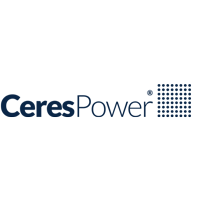Ceres Power Holdings plc (LON:CWR) Chief Executive Officer Phil Caldwell caught up with DirectorsTalk for an exclusive interview to discuss their latest trading update, the opportunities for the business, the effects of Trump and Brexit and expectations for the second half of their financial year
Q1: Now Phil, you’ve just issued your trading update, can you tell us how the last 6 months have been?
A1: We’ve had a really positive first 6 months of our financial year, in fact we’re on track probably for our best financial year ever, we’ve got very strong revenue growth now so we’ve tripled revenue in the first half compared with the same period last year. We’ve secured a number of big name OEM partnerships this year and at the half year we had almost £5 million of new business under contract which would flow through in the remaining second half of this year and also in following years. Also, on a balance sheet point of view, we did a very successful fund raise in Q4 last year so at the turn of the year we had £22 million of cash on the balance sheet as well so going into the second half of the year we’re in probably the best financial shape we’ve ever been.
Q2: What are the opportunities for Ceres Power Holdings plc?
A2: Well, we’ve been diversifying the business on the back of the advances we’ve made in the technology so Ceres Power originally was focussed purely on the home system market and what we’ve done this year is we’ve added several different sectors; data centres, electric vehicles and the commercial sector in particular.
So, if we take those in turn, our US activity was cemented with a Department of Energy and Cummins development agreement which is focussing on developing modular power systems to data centres. Now, data centres are a hugely-growing consumer of electrical power, in fact they account for something like 3% of all electrical power generation globally which to just put that into context is about the size of the UK. You’ve got a large growing number of big name players like Apple Inc. (NASDAQ:AAPL), Google (Alphabet Inc – NASDAQ:GOOGL), Microsoft Corporation (NASDAQ:MSFT) etc., all starting to look at fuel cell technology to power data centres. So, going after that market in North America with Cummins, with US Department of Energy backing, was a major step forward for us in terms of addressing that particular market.
Another partnership we signed in the past 6 months is with Nissan and Nissan, as you know, are the world’s biggest provider of electric vehicles and really, we’re looking at basically doing a battery charger using biofuels, using our fuel cell as a range extender for electric vehicles. So, that’s another huge growth area and very topical at the moment with the industrial strategy coming out and a big focus on battery technologies and our fuel cells are very complementary working in tandem with batteries.
The final deal we did, just before the turn of the year, was in the commercial sector with a new OEM partner which we can’t name for commercial reasons but it’s quite pleasing for us because it’s somebody who’s got a very clear intent to launch products really focussing on businesses.
So, all of that activity in the past 6 months has really broaden out the opportunity for the business quite significantly.
Q3: What effects does Trump in the US and Brexit in the UK have?
A3: Well Trump in the US is obviously an interesting one and a lot of people kind of think that Trump is going to pursue an anti-renewable pro-fossil fuel kind of agenda, that might well be the case, in the case of our technology, we’re fuel-agnostic so, particularly for stationary power for things such as data centres or commercial buildings, our fuel today we run on natural gas. Like I said with Nissan, we’re looking at biofuels and we can actually operate all the way through to any blend of natural gas with hydrogen all the way through to hydrogen in the future. For where we are today we see the US market is probably increasing its reliance on natural gas and therefore technologies such as ours, which are the most efficient way to generate power from natural gas, are set to benefit. So, consequentially, I don’t see any downside at the moment from what’s happening with the change of administration in the US.
Brexit issue is another interesting one because we’re actually a great example of a British technology company that’s actually exporting technology. Of that revenue and order book I talked about earlier, 90% of that, approximately, is with Japan, the US and Korea so we’re actually almost a model company in terms of backing British technology to trade outside of the EU right now. It doesn’t mean we’re not going after the EU as well, of course we are, Germany is a big target market but on our current business today we’ve had phenomenal success, like I said, outside of the EU so we’re very well positioned.
Q4: What are your expectations for the second half for Ceres Power Holdings plc?
A4: I’m expecting a very good second half, we’ve got good partners in place, some of those we’ve signed very recently so some of the contracted revenues we’ve got on the order book will start to come through to continued revenue growth, I think you can expect that. I said last year we were after 5 partners, I expect we will sign that fifth partner this year and all of that will contribute to the growth in the top line and also towards the cash position of the company as well. So really looking forward to a very strong second half of our financial year.

